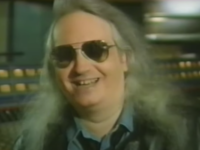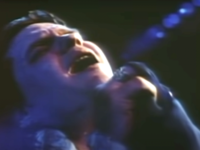Ellen Foley has made a massive mark in the annals of rock music. Her vocals on Meat Loaf’s classic Bat Out of Hell were integral on an album which has long sat on rock ‘n’ roll’s top table. Her explosive duet on “Paradise By the Dashboard Light,” her irresistible exuberance on “You Took the Words Right Out of My Mouth” and her joyous camaraderie and on “All Revved Up With No Place to Go” made music’s foundations shudder.
After declining an offer to join the subsequent Bat Out of Hell tour in favor of theater work, Foley released a series of vastly different solo albums. Ian Hunter and Mick Ronson (Mott the Hoople, David Bowie) worked with her on 1979’s rocking Night Out, which featured the fabulous “We Belong to the Night.” Talk about leaving it all out there. The track was co-written by Ellen with Fred Goodman.
Spirit of St Louis, from 1981, featured members of the Clash and the Blockheads as her backing band. Wow. Furthermore, Joe Strummer and Mick Jones contributed half a dozen cracking songs. This bohemian, European-sounding record was recorded at the same time as the Clash’s Sandinista opus. It is almost its companion piece. Foley famously sang on “Hitsville UK,” everyone’s secret favorite Clash single, lifted from Sandinista. Pure gold. Foley further worked with the band on “Overpowered By Funk” on 1982’s Combat Rock.
Foley has more recently joined forces with Paul Foglino, of 5 Chinese Brothers. About Time, released in 2013, was the first fruit of their liaison. Now a new album called Fighting Words is ready to be unleashed. Packed with succinct, strong tunes, it is a defiant piece of work, full of positivity. Lead single “I’m So Happy to Be Here” came out earlier this year. The cut features Karla DeVito, who took Foley’s place on that original Bat Out of Hell tour back in the 1970s.
Away from rock music, Foley has appeared on numerous theater stages and on celluloid in many a Hollywood blockbuster, including Tootsie (opposite Dustin Hoffman), Cocktail (Tom Cruise) and Fatal Attraction. She had subsequent roles in No Pay, Nudity (with Gabriel Byrne) and Lies I Told My Little Sister, which included her version of “Heaven Can Wait” in its soundtrack. She famously played Billie Young on NBC’s Night Court.
Ellen Foley joins us for an exclusive Something Else! Sitdown to chat about Fighting Words, Jim Steinman, Ian Hunter, her favorite musical moments and … America’s Voldemort. Fighting Words is out on Aug. 6, 2021.
PAUL MATTS: Was the new album conceived before the pandemic?
ELLEN FOLEY: Yes. It has been a five-year process. Paul Foglino meticulously connected everybody up, all the players, virtually, before there was a pandemic. Everybody was able to do it in their own studios. Some people weren’t nearby and even if they were, Paul did the rhythm tracks and sent them to the guitar player, keyboard player, whoever. It then came to me, and I sang the tracks on my home in my living room. It was all done before the lockdown, and it sat there for a while as I wasn’t sure what I wanted to do with it. I think I felt it was something in my past, and incidental. Paul would show up now and then in my living room to work on it – that’s what I mean by incidental. But when it was all pieced together I heard what it was. It made sense. I got excited. Because it’s so good!
PAUL MATTS: Absolutely is. When I heard it, it reeks of positivity, and putting things back together again. It’s interesting you say it was recorded before the events of the past 18 months.
ELLEN FOLEY: Yes, but we had five years before the pandemic. We were in a terrible dark time for those of us who weren’t insane and stupid. [Laughs.]
PAUL MATTS: I know what you mean and to whom you refer to, I think.
ELLEN FOLEY: [Laughs.] It’s the name that dare not be spoken. I never say his name.
PAUL MATTS: Shall we call him Voldemort?
ELLEN FOLEY: Yeah, man. We’ll call him the national Voldemort! That’s great. A lot of that had to do with personal resilience when you’re being faced with a very dark time, and you feel like everything you believe in has a literal wall that is being built around it. So even though it was before the pandemic, [Fighting Words] resonates with it, and the national disgrace we were living in. And you know, some of it was synchronicity. Whatever was happening in Paul’s mind resonates with the time then and the time now. The two pandemics – one was an epidemic, and one was a pandemic.
PAUL MATTS: This is the second album you’ve done with Paul Foglino. How did the two of you meet?
ELLEN FOLEY: I’ve known Paul a very long time. I had a good friend of mine who happened to be involved with La Mama, on the lower east side, one of the most famous off-Broadway theaters. ‘La Mama’ was a woman called Ellen Stewart who championed experimental theater. Mary was involved in La Mama, and she did theater things that Paul played on. But then he and she wrote a show. She wrote the book, and he wrote the music and lyrics. It was called Hercules and High Suburbia. I sang Paul’s music and like what happened with [late Bat Out of Hell collaborator Jim] Steinman, we kind of clicked.
After that we said, “Let’s have a band and we were gonna be a [Rolling] Stones covers band.” I made a list of Stones songs, but he was not enthusiastic and went off. Anyway, a couple of the songs from the show were on the first album [About Time]. Paul was in a band called 5 Chinese Brothers, and more of the songs came from them. So, finally, we put a band together, the old-fashioned way. We started playing ’round the city and as we’re going, he wrote the songs for me. It was a collaboration between me as a performer, and the band. It felt natural and – do I dare I use the word? Organic.
PAUL MATTS: He articulates feelings well in his songs. He’s very succinct.
ELLEN FOLEY: A fantastic observation. Paul, I guess, comes from the folk scene. On the surface, he is unsentimental, and just wants to say what he wants to say. He has a mathematical mind; I mean, he has a degree in engineering from Columbia. He doesn’t waste time. He gets things done. But when you hear the lyrics, some of them are very heartfelt and emotional. He’s just able, as you say, to put things in a very succinct package. Yeah, that’s great.
PAUL MATTS: You mentioned the meeting of minds, like with Jim Steinman. Jim sadly passed away recently.
ELLEN FOLEY: It wasn’t sudden. He’d been ill for some time. So, it wasn’t a surprise.
PAUL MATTS: Of course. The album ends with a beautiful new version of “Heaven Can Wait,” a resonant song. As every year passes, every decade passes, it has a different meaning. It develops a different perspective.
ELLEN FOLEY: All I can do is do it from my perspective. People ask me about it, and the first thing that touched me was the melody. It’s just extraordinary. And I think it’s different from anything else Jim wrote. You talk about how it changes through the decades. For me, it talks about mortality and loneliness but also hope. There’s a hopefulness to it. I first sang the song when I was 25 years old for a show of Jim’s called Neverland – well before Meat Loaf recorded it. It was a different thing back then. There was this girl Wendy, and Neverland has always been for the Lost Boys and Peter Pan – and here I was singing it in a nightgown with blood all down it. You could imagine what that was [laughs], the virgin sacrifice or something. A whole different perspective. Meat Loaf, of course, had a whole emotional read on it, but mine is mine. I love it.
PAUL MATTS: It does balance the record beautifully, I think.
ELLEN FOLEY: Yeah, I always like the last song on an album to be super emotional. There’s a song on the Night Out album [“Don’t Let Go”] I did with Ian Hunter, and on the last album with Paul [“Everything’s Gonna Be Alright“], and now there’s this. It can be viewed as an extra track here. It’s absolutely nothing to do with the rest of the record, musically, but emotionally it does connect for sure.
PAUL MATTS: Karla DeVito is on the album too. Is that the first time you’ve recorded with Karla?
ELLEN FOLEY: We recorded together on the last Meat Loaf record, a song called “Braver Than We Are.” It was a trio, her, Meat Loaf and me. I don’t know if anyone heard it, because the whole the package wasn’t exactly stellar. I vaguely knew Karla before Bat Out of Hell. In the show Neverland, she and her band were the band and the back-up singers. I knew she was a nice girl. You know, I turned down the tour (for Bat Out of Hell) and they hired her. The whole video thing was handled a little rough: They said to me she was the woman on tour, and who the fans are gonna relate to.
I called myself the Marni Nixon of Rock ‘n’ Roll. You know who I mean? She sang in the original scores to My Fair Lady and West Side Story. So, all these famous movie stars were lip synching to her. I was like, “Ha, that’s cute!” I was upset for a time, but after a while I became an entity on my own. Anyone who knew anything knew I sang on Bat Out of Hell. I got over it. She and I, a few years ago, did this tribute show to Jim that he came along to, in his wheelchair. A bunch of people sang his songs and of course, I sang “Heaven Can Wait.” So, we just started talking and connected, and it’s become a great thing.
PAUL MATTS: “I’m Just Happy to Be Here” is euphoric, passionate. The lyric is strong.
ELLEN FOLEY: Oh man, I love it. It’s great. The history of it is that after me and Karla got friendly, I said to Paul – “Oh man, write a song for me and Karla – you know, after the fisticuffs.” He said, “Nah, I’m not doing that! Get out of here. That’s stupid!” [Laughs.] So, he wrote something else, about getting to a place where we are now. It’s so much better than my idea! She’s happy, so am I. It’s really meaningful and luckily he didn’t pay any attention to me!
PAUL MATTS: Was it always going to be the first single from the album?
ELLEN FOLEY: We had no real plan. Paul is like, “Mr. Underground,” ya know, and just goes “Ah, let’s just put it on a CD Baby and see what happens. Like the last one.” But then we connected with [PR consultant] Randy [Haecker]. I love Randy; he’s very meticulous. He made a plan and said, “This is going to be a single, and ‘Are You Good Enough,’ the first track, is to be the second single – and the whole thing is going to be out in August.”
PAUL MATTS: “This Won’t Last Forever” – is that about Voldemort?
ELLEN FOLEY: [Laughs.] It’s about somebody who’s trying to sleep through the whole thing. And the song “Leave Him Janie,” Paul put together a collage of Voldemort, and is pretty much a direct reference to the situation.
PAUL MATTS: Another song on the album which sounds pivotal is “Fill Your Cup,” a beautiful, sensitive, healing number.
ELLEN FOLEY: I say to people that to me, “Fill Your Cup” is the most important song on the record. Because since the early albums, I have had children, a husband and I really understand that I am able, and women are able, to make families and bring people in. I think it’s the centerpiece of the record.
PAUL MATTS: If I could touch on your earlier career, was there any sense when you were recording Bat Out of Hell that it was so special?
ELLEN FOLEY: You know, what I say about that was that I was around the whole thing from the beginning. Steinman had this habit of calling you up at three in the morning and saying, “Hey, ‘Funky’ [Steinman’s nickname for Foley], what do you think of this, or what do you think of this lyric?” And I’m like, “What? Why ask me? Yes, that’s great. What the fuck do I know – you’re Steinman!” Even then he was “Steinman.” But I was just part of something, and it was the first recording I sang on. I was just listening to the Eagles and, of course, the Rolling Stones. I had no clue. But then again, I knew it was something good and I was part of its DNA, and it was part of mine. It was so hard to get someone to put it out, until we found Steve Popovich and Todd Rundgren to produce it.
PAUL MATTS: It was so different wasn’t it? It had everything but the kitchen sink thrown in.
ELLEN FOLEY: Oh man, yeah. There was a story that these A&R guys came into the room where we were working on it and ran away. They didn’t know what to do with it. It was such a risk.
PAUL MATTS: A few years later you hooked up with Joe Strummer and Mick Jones from the Clash for your second solo album, Spirit of St. Louis. It’s one of my favorite LPs.
ELLEN FOLEY: It is? Oh my god. I played it recently. I think the songs are good, the production is very, very cool but I didn’t sing as me, and my singing is a little subdued. Had it been my fourth or fifth album down the road, people would have paid more attention to it, ya know.
PAUL MATTS: Have you approached your solo records with a blank sheet of paper each time? They’re all quite different, especially the early ones.
ELLEN FOLEY: Well, the one I did with Mick Ronson and Ian Hunter was my first one and was definitely a blank sheet of paper, because after I met Popovich there was a year of demos. I was collecting songs. I sat with my vinyl collection and found songs I wanted to sing. That went on for a long time and that was my blank sheet of paper. When I met Mick and Ian, I took it to them and they added to it. They took away some numbers and added more. And course, I had “We Belong to the Night.” I was fortunate to hook up with a guy called Fred Goodman and we wrote that. Other songs were covers, and this all filled that blank piece of paper.
PAUL MATTS: Are there any personal highlights from your solo career? Unfair question, I know.
ELLEN FOLEY: Gosh, right now, this whole album is a highlight for me as it is a re-emergence. And of course, “Heaven Can Wait” has been a super emotional touchstone for me. I sang it first in 1977. And “We Belong to the Night” from the first record, and the last track on it I did with Ian [Hunter], “Don’t Let Go.” And off Spirit of St. Louis, I love “Torchlight”, the one I sang with Mick [Jones]. It’s in the same pocket as “Hitsville,” and has this great rhythm, this great feel to it. They are some of my favorite things.
- Ellen Foley Talks ‘Bat Out of Hell,’ Ian Hunter and ‘Fighting Words’: Something Else! Interview - July 9, 2021
- Pink Floyd’s ‘Atom Heart Mother’: 50 Years Gone - March 30, 2020
- Marillion – ‘With Friends From the Orchestra’ (2019) - January 16, 2020




